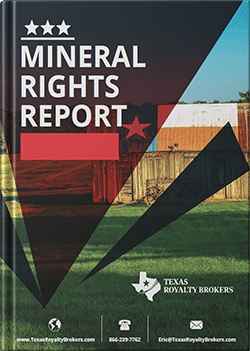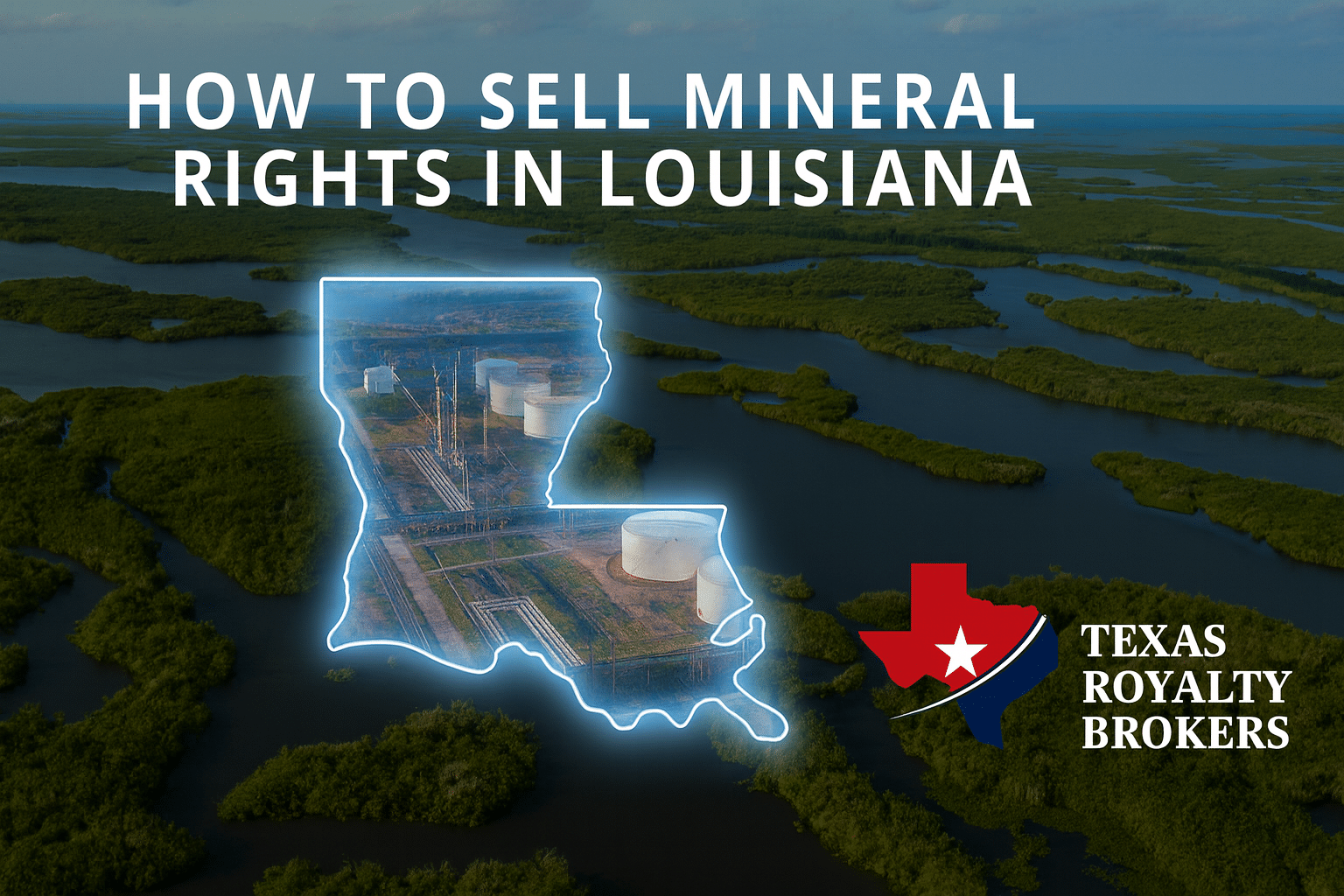Why Texas Royalty Brokers?
sellers
Buyers
State Specific Guides
Resources
Louisiana Mineral Rights: Value & Pricing Explained
If you own oil and gas mineral rights in Louisiana, this is the guide you’ve been looking for.
Whether you inherited them, bought them, or just recently found out you own them, it can feel overwhelming trying to figure out what they’re worth and what to do with them.
Should you lease them? Sell them? Hold onto them? And how does Louisiana’s unique legal system affect your rights?
In this post, we’re breaking it all down in plain English.
You’ll learn how mineral rights work in Louisiana, what makes them valuable, and most importantly how to make sure you don’t leave money on the table when it comes time to sell. We’ll even show you a real-life example of how one mineral owner boosted their final sale price by 28% just by approaching it the right way.
If you want to understand your mineral rights in Louisiana and make smart decisions with them, you’re in the right place.
Oil and Gas Mineral Rights in Louisiana
Mineral rights in Louisiana give the owner the legal right to explore for, produce, and sell oil, gas, or other minerals from beneath the surface of a property. These rights can be incredibly valuable, especially in areas with proven production like the Haynesville Shale or parts of South Louisiana.
If you own mineral rights, you don’t necessarily own the land above. The surface and mineral rights can be owned by different people. In many cases, someone inherits mineral rights from a parent or grandparent and doesn’t even realize it until an oil company sends a lease offer in the mail.
What makes Louisiana a bit different is the way the state treats mineral rights under its legal system. While most states operate under common law, Louisiana follows a legal tradition rooted in the Napoleonic Code. This affects everything from how mineral rights are created to how they expire or revert back to the surface owner. We’ll cover more on that later in the post, but it’s something every mineral owner in Louisiana should be aware of.
Owning mineral rights gives you the opportunity to lease those rights to an oil company, collect royalties from production, or even sell the rights outright for a lump sum. Knowing your options is key, because making the wrong move can cost you real money.
Next, we’ll break down the different types of mineral ownership in Louisiana, because not all mineral rights are the same.
Common Types of Mineral Ownership in Louisiana
Not all mineral rights are created equal. In Louisiana, there are several different ways mineral rights can be owned or shared, and understanding what kind you have is critical when it comes to leasing or selling.
Here are the most common types of mineral ownership:
1. Full Mineral Ownership
This is the most straightforward and valuable type. If you own full mineral rights, you have the legal right to lease, sell, or produce the minerals under your property. You’ll also receive 100% of the royalties associated with your interest (after any deductions outlined in a lease agreement).
If your check stubs show that you have a “Royalty Interest” this means you likely have full mineral rights ownership.
2. Non-Participating Royalty Interest (NPRI)
An NPRI owner is entitled to a portion of the royalties from production but doesn’t have the right to negotiate leases or receive bonus payments. These are often created when someone sells their mineral rights but keeps a slice of the royalty income.
3. Overriding Royalty Interest (ORRI)
This type of interest is tied to a specific lease and doesn’t transfer with the land or mineral rights. It’s typically reserved for landmen, geologists, or others involved in negotiating oil and gas leases. Once the lease expires, the ORRI usually goes away.
4. Executive Rights Only
In some cases, someone might only hold the right to negotiate and execute leases (called “executive rights”) while another person holds the actual mineral interest and receives the royalties.
Understanding Undivided Mineral Interest
This is when multiple people share ownership of the same mineral rights. For example, if three siblings inherit mineral rights from a parent, each may own one-third of the interest. Even though you only own a portion, you still have the right to lease or sell your share. While there are different types of mineral rights ownership described above, most of these are still considered and undivided mineral interest.
If you’re unsure what type of ownership you have, you’re not alone. Many people inherit mineral rights without clear documentation. A good mineral rights broker, like Texas Royalty Brokers, can help you figure out exactly what you own so you can make informed decisions.
Next, let’s take a look at leasing mineral rights and what that really means for Louisiana owners.
Leasing Mineral Rights in Louisiana
Leasing mineral rights is often the first step many owners take when an oil company is interested in drilling. A lease gives the oil company the right to explore and produce oil or gas from your minerals for a set period of time, usually in exchange for a signing bonus and a share of the production income, known as royalties.
But before you sign anything, it’s important to understand how leasing works in Louisiana and what to watch out for.
How Leasing Mineral Rights Works
When you lease your mineral rights, you’re granting temporary access to an operator. In return, you typically receive:
-
A Lease Bonus: A one-time upfront payment when the lease is signed. These can range from a few hundred to several thousand dollars per acre depending on location and demand.
-
Royalty Payments: A percentage of the revenue generated from oil or gas production on your property. In Louisiana, royalty rates usually fall between 18% and 25%.
-
A Primary Term: Most leases last 3 to 5 years. If the company doesn’t drill within that time, the lease expires unless it’s extended or renewed.
Watch Out for These Clauses
Louisiana leases can be complicated, and many mineral owners miss important details. Here are a few key items to look for:
-
Deduction Clauses: These outline what post-production costs can be subtracted from your royalty payments. Some leases allow deductions for things like processing or transportation, which can eat into your income.
-
Pugh Clause: This protects you from having the entire mineral estate tied up if the company only drills on part of your property. Not every lease includes this, but it’s worth asking for.
-
Depth Severance Clause: Helps limit the lease to certain depths. If the company only drills shallow wells, this clause can preserve deeper rights for future opportunities.
Why Some Owners Choose to Sell Instead
Leasing can be a good short-term option, but it’s not always the best long-term move. If you need a lump sum of cash, want to reduce your risk, or prefer not to deal with the unpredictability of royalties, selling mineral rights might make more sense.
And remember, just because you lease your rights doesn’t mean you can’t sell them later. In fact, leased minerals often sell for more because they come with cash flow potential.
Coming up next, we’ll walk through the process of how to sell mineral rights in Louisiana and what you need to know to do it the right way.
How to Sell Mineral Rights in Louisiana
Selling your mineral rights in Louisiana can be a great financial move, but only if you approach it the right way. Many owners accept the first offer they get without realizing how much more they could have made with a little planning and the right team on their side.
Here’s how to sell mineral rights the smart way and make sure you get the best price possible.
Step 1: Gather Documentation
Serious mineral buyers want to verify what you own before they’ll make a real offer. Having the right documentation ready upfront helps you get better bids and move through the process faster.
Here’s what to collect:
-
If your minerals are leased:
You’ll need a full copy of the lease agreement and either the order for payment or a document showing the lease bonus amount you received. -
If your minerals are producing:
Download the last three months of royalty check stubs. You can usually get these from your operator’s website or through a portal like EnergyLink. -
Optional: Legal description or Deed:
Any paperwork that shows where your mineral rights are located and how much you own will help buyers evaluate your interest.
If you don’t have all of this, don’t worry. A mineral rights broker can help you track it down and get everything organized.
Step 2: Pick a Mineral Rights Broker
This step makes the biggest difference in how much money you walk away with. A mineral rights broker works for you, not the buyer. Their job is to understand what you own, market it professionally, and bring in offers from serious, qualified buyers.
Trying to sell on your own usually results in lower offers and more headaches. Most mineral owners don’t have access to competitive buyers or the tools to properly market their interest. A good mineral rights broker creates competition and uses it to drive up your sale price.
Did you know that in Louisiana, mineral owners who use a broker typically sell for 10% to 30% higher prices net of commission?
Texas Royalty Brokers does this every day for owners across Louisiana. We know the market, we know the buyers, and we know how to get results.
Step 3: Get Competitive Bids
Once your listing is prepared and shared with buyers, the offers start coming in. A good broker will collect multiple offers and walk you through the pros and cons of each one.
It’s not always just about the highest number. Some offers come with red flags like long due diligence periods, unclear funding sources, or tricky contract terms. Your broker will help you filter out the bad apples and focus on strong, reliable bids.
The more competition there is, the better your final price will be.
Step 4: Escrow and Closing
After you accept an offer, the buyer will begin their due diligence process. This usually involves reviewing title documents, production records, and lease agreements to confirm everything checks out.
Once the buyer gives the green light, the deal moves into escrow. A mineral rights broker will walk you through this process to ensure you are protected. When everything is verified and finalized, the money is wired to you and the mineral deed is recorded with the parish.
Selling mineral rights should be simple, safe, and profitable. In the next section, we’ll break down how much your mineral rights might be worth and what factors go into determining their value.
How Much Are Mineral Rights Worth in Louisiana?
The value of mineral rights in Louisiana can vary a lot, even from one parish to the next. Some owners might get a few thousand dollars per acre, while others receive tens of thousands depending on where their minerals are located and whether they are leased or producing.
If you’re trying to figure out how much your mineral rights are worth, here are the key factors that go into the equation.
1. Location, Location, Location
This is the biggest driver of value. Minerals located in high-demand areas like the Haynesville Shale, Cotton Valley, or areas with active drilling will always be worth more. Buyers want minerals that have near-term production potential or existing wells in place.
If you’re in an area where operators are leasing aggressively or where permits are being filed, that can significantly boost the value of your mineral rights.
2. Lease Status
Leased mineral rights are often worth more than unleased minerals, especially if the lease includes a strong royalty rate and favorable terms. A lease bonus alone doesn’t mean much, but a good royalty clause with limited deductions can make your interest more appealing to buyers.
Unleased minerals still have value, but they’re considered higher risk since there’s no immediate production or cash flow.
3. Production and Royalty Income
If your minerals are currently producing and you’re receiving royalty checks, you’re in a stronger position as a seller. Buyers will look at your monthly royalty income and project that into future cash flow to determine what they’re willing to pay.
In many cases, buyers will offer you a multiple of your average monthly royalty. For example, if you’re receiving $500 per month, you might get offers between $15,000 and $25,000 depending on other factors like decline rate, operator, and location.
Keep in mind that cash flow or royalty income is only one piece of the equation. Mineral rights value in Louisiana is based upon the cash flow value + upside potential.
4. Operator Activity and Permits
Even if your minerals aren’t producing today, if there’s active development in the area, that can push your value up. Buyers look at recent permits, drilling results, and operator leasehold maps to assess future potential.
Some buyers are even willing to pay a premium for minerals in areas where drilling is likely in the next 6 to 12 months.
5. Market Conditions
Oil and gas prices impact mineral values across the board. When prices are high and buyers are optimistic about future production, values tend to rise. In a down market, values can drop quickly. That’s why timing the market can be just as important as location.
Putting all of these factors together takes experience and real market insight. That’s why mineral owners who work with a broker almost always come out ahead. You get real-time pricing feedback from active buyers, not just a guess based on what your neighbor got.
Up next, we’ll show you a real-life case study of how one Louisiana mineral owner was able to increase their final sale price by 28 percent just by working with the right broker.
Calculate Mineral Rights Value in Louisiana
The value of mineral rights in Louisiana is primarily driven by royalty income, well performance, operator activity, and future development potential. While every property is unique, recent royalty checks provide a useful starting point for estimating value.
The calculator below uses your average monthly royalty income to generate a quick, income-based estimate of what your Louisiana mineral rights may be worth today. This approach reflects how many buyers initially evaluate producing minerals, particularly in active basins across the state.
Use this calculator to get a general sense of value based on cash flow. Keep in mind that this estimate does not account for factors such as multiple wells, well age, undeveloped acreage, future drilling, or changes in commodity prices.

Next Step: Get Competitive Bids
An online estimate is only a starting point. Actual market value is determined by buyer competition.
Texas Royalty Brokers works with a broad network of qualified mineral buyers to create competitive bidding environments for Louisiana mineral owners. This process often results in higher offers than a single, unsolicited bid.
After using the calculator above, contact us to request a competitive bid review. We will evaluate your specific wells, income history, and upside potential to help determine what your Louisiana mineral rights are truly worth in today’s market.
Case Study: How One Owner Increased Their Sale Price by 28%
We recently worked with a mineral owner in Louisiana who inherited mineral rights. She had been receiving royalty checks for a few years and was curious about selling. After reading our mineral rights tax article, she understood that due to step-up basis she could sell and owe virtually $0 in taxes for a mineral rights sale in Louisiana.
Like many owners, her first step was to search online and reach out to a few buyers directly. She received a few offers and was tempted to accept the highest one. The highest offer was for $145,000 for her producing mineral interest. It sounded like a lot of money, and she was ready to move forward.
Thankfully, she contacted Texas Royalty Brokers before making a final decision.
How Texas Royalty Brokers Helped
We started by reviewing her documentation and confirming exactly what she owned. Once everything was verified, we created a professional listing package and marketed her minerals to our network of qualified buyers. These included investment groups, energy funds, and companies actively acquiring mineral interests.
By reaching a wide pool of serious buyers, we were able to create competition. Multiple offers came in, and they were significantly stronger.
In the end, we secured a final offer of $185,600 net of commission. That’s a 28 percent increase over the original offer she received on her own.
Why It Worked
Most direct buyers are hoping to find mineral owners who will accept an offer without shopping it around. They rely on sellers not knowing the true value of what they own.
After listing at Texas Royalty Brokers and getting competitive bids, this client walked away with substantially more money. This is not an extreme example. On average our clients get 10% to 30% higher prices net of commission. Over 95% of clients who list end up walking away with a much better deal.
Why Work With Texas Royalty Brokers When Selling Mineral Rights in Louisiana
Selling oil and gas royalties is not like selling a car or a house. It’s a specialized market with a small pool of serious buyers and a lot of unknowns for most mineral owners. That’s why working with a mineral rights broker who understands the Louisiana market is so important.
At Texas Royalty Brokers, we focus exclusively on oil and gas mineral rights. Our team knows how to evaluate your property, market it the right way, and negotiate with experienced buyers to get you the highest price possible.
Here’s What Sets Us Apart
1. We Specialize in Louisiana
We understand the unique aspects of Louisiana’s mineral laws and market trends. From forced pooling differences to production data and lease structures, we know what to look for and how to present your minerals in the best light.
2. Access to Serious Buyers
We have relationships with thousands of active mineral buyers across the country. These aren’t random individuals sending out postcards. They’re vetted, well-funded groups that compete against each other to win deals. That competition drives up your price.
3. Transparent Process
We keep you informed every step of the way. From your initial valuation to reviewing offers, we explain things in plain language and help you make smart decisions. There’s no pressure to sell unless the right offer comes in.
4. You Get Paid More
Our clients regularly receive higher offers than they could get on their own. We don’t just list your minerals and wait. We actively promote your listing and push buyers to come in strong with their bids.
5. No Upfront Fees
You pay nothing unless you choose to sell. We only get paid when you do, and our incentives are completely aligned with yours.
We’ve helped mineral owners across Louisiana unlock the full value of their mineral rights. Whether you’re sitting on leased acreage, collecting small royalty checks, or holding onto unleased land in a high-demand area, we can help you understand what you own and get the best possible deal.
In the final section, we’ll cover how Louisiana’s unique legal system plays into all of this and why it’s important to work with someone who understands the details.
Louisiana’s Unique Legal System and How It Impacts Mineral Rights
Louisiana is the only oil and gas state that follows the Napoleonic Code instead of common law, and that changes how mineral rights are handled in a few important ways.
One of the biggest differences is something called “prescription of nonuse.” In simple terms, if your mineral rights sit idle for 10 years with no leasing or production, you could lose them. The rights can automatically revert back to the surface owner. This surprises a lot of mineral owners who think they can just hold on forever.
Pooling also works differently here. In Louisiana, the state can force your minerals into a drilling unit even if you never signed a lease. You might still get royalties, but the rules around unit sizes and how production is shared can be confusing. It’s one more reason local knowledge matters.
The legal language used in Louisiana mineral deeds and lease agreements is also unique. If you’re not familiar with it, it’s easy to miss key details that affect your rights and your value.
This is why working with someone who understands Louisiana’s legal system is so important. At Texas Royalty Brokers, we know how to navigate the state’s laws and protect your interests every step of the way.
Thinking About Selling? Reach Out to Us
If you own mineral rights in Louisiana, we’re here to help you understand what they’re worth and how to get the best possible deal. Whether you’re ready to sell now or just exploring your options, Texas Royalty Brokers can guide you through the process from start to finish.
We specialize in Louisiana mineral rights, we know the market, and we have the buyers.
Reach out to us for a no-obligation, free consultation. We’ll help you make a smart, informed decision.






